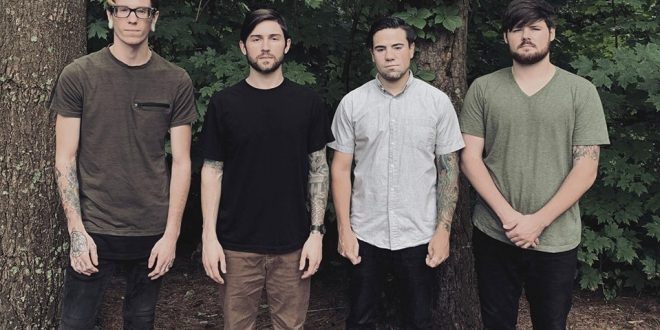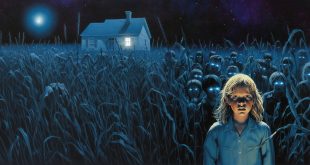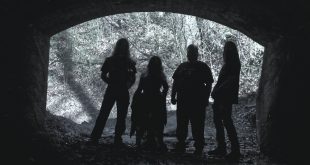Kentucky post-hardcore act Softspoken is well on their way. Despite various initial hurdles in their tenure, the Florence-based quartet’s debut album, Deaf Perception, has recently climbed the Billboard charts, placing at 20 on Hard Rock, and at 19 on Heatseekers. Today, the band will perform in Louisville at the Tiger Room alongside As Cities Burn, who are wrapping up their album release tour.
The day before their show, I caught up with Softspoken guitarist Christ Wethington to discuss live performance, his formative influences, and the band’s present outlook given their debut album’s success.
ME: I understand you have a show coming up. Let’s start with that.
Chris: Yeah! Tomorrow, we play the Tiger Room down in Louisville. As Cities Burn is finishing up their tour, and we’re friends with the promoter since we play in Louisville quite often, so he hooked us up. I’m definitely looking forward to playing with one of our favorite bands, and it’s exciting, both as a fan and as a performer, to be a part of that.
ME: When it comes to playing live, what do you enjoy the most?
Chris: That’s a good question. For me, it’s all about connecting with people. Everyone who’s at a show might be there for different reasons. They might have a different taste in music or a different path in life, or be interested in very different things outside of their little music worlds. But when you’re at a show, that seems to be the source for everyone’s sense of connection regardless, and that’s what I enjoy.
ME: Part of Softspoken’s concept involves the notion of staying true to yourself. Did you have difficulty expressing your talents with other bands in the past?
Chris: Yeah. The whole reason Softspoken got started was because of my situation at the time. I was living overseas in Japan for a few years, playing with this indie band who had kind of a pop punk sound. I’d never really been into that style. Nothing against it, it’s just not my thing. But while I was in that band, I felt like I was in a place where my creativity wasn’t coming out naturally; my contributions were very forced, and it just didn’t feel right.
From there, I started writing stuff on the side for a project I called Softspoken, and then I decided to make it into a band with that idea in mind. These days, this band is everything I need in terms of expressing creativity, and I think the other guys would agree. More so with the album we’ve just released, it’s exactly what we’d wanted to write, and how we wanted to write it.
ME: When it comes to music that you like, and that you’re comfortable playing, which artists help shape your sound as you were growing up?
Chris: In the very beginning, I was introduced to The Beatles by my mom; that’s the first kind of rock music I remember listening to as a kid, and I still love them. My dad, he’s into old country music like Johnny Cash and Merle Haggard – all kinds of country, blues, and classic rock. I also have a brother who’s 11 years older than me, and he’s very into Nirvana, Weezer, Smashing Pumpkins, and all this grungy-type stuff. He was in a band back then with a similar sound, so he kind of took me on that path. Then, in high school, I really got into Blink 182 for a while, and then Metallica. A lot of my friends were into As Cities Burn, Underoath, Senses Fail, Chiodos, and that started me on a sort of a post-hardcore path.
ME: In Softspoken, how would you say your chemistry between each other is now?
Chris: It’s great! We’ve gone through member changes like many bands do. Sometimes, that stuff is necessary. But I think the chemistry we have now is a lot better than it has been. We’re all a little bit older, and because of that, we’ve grown accustomed to things that happen in the music industry and in life, but we all come from stable places outside the band. In terms of writing, we all have different styles and preferences. I’m more of a chill post-hardcore kind of guy, whereas our lead guitarist, Billy Zimpelman, is a lot more metal-inclined, our singer, Sam Scheuer, is really into punk and reggae, and our drummer’s kind of all over the place (laughs). But we all fit those sounds together, which is good. Outside of writing, we just hang out, and on the road together, we mesh pretty well.
ME: Your new album, Deaf Perception, got on Billboard! Congratulations, man!
Chris: Thanks very much!
ME: Did its chart placement come as a surprise to you, with rock how it is nowadays?
Chris: I mean, we knew we had a goal in mind of being on the charts, and I’m happy that we’d gotten there; it was even higher than I’d expected! When writing for the album, we made the decision that we’re just going to write what we’re going to write. I’ve noticed a lot of modern rock has stayed in that pop sphere and is more radio-friendly. We’d debated going in that direction, but then we thought of just writing the best songs we could. By doing that, we knew that maybe our music wouldn’t catch on as quickly, but I figured that for those who are willing to sit down and listen to the album as a whole, there’s stuff I think everyone will enjoy. When it comes to our live performance, that’s where our music shines. I think that helped a lot with the charting because we were on a pretty big tour and were able to sell a lot of albums.
ME: It seems like live performance and the studio go in tandem, in that sense, because you’re able to transfer that energy into your recordings.
Chris: Yeah, we try for sure, and that’s actually a big reason why we went with Matt Goldman, who’s recorded with Underoath, As Cities Burn, and a bunch of other bands. The main reason was his natural, raw approach to recording. All of the sounds are authentic; nothing’s digital, and we wanted that to come through in the recording.
ME: At first, you had an EP out, Pathways, which turned into a mini album upon re-release, and now Deaf Perception is your debut full-length. What went on during that transition?
Chris: Our EP had a bit of a different lineup at the time, and the decision to re-release it was more of an industry reason, but in the midst of that, we started writing for Deaf Perception. I mean, it was a good seven or eight months that we were just writing.
You know, there’s always that debate of whether to put out a full album or a single, especially in today’s industry, and we’ve actually implemented a hybrid of that. See, our album’s out now physically through our website, and digitally, we’re releasing it on a song-by-song basis for the rest of the year, just to see how that works out. But whether it’s on CD or Spotify, I prefer digging into the vibe of a full album rather than just listening to one-off singles. I won’t say there’s the intention of it being this involved, conceptual story, but it’ll still be able to take listeners on some kind of journey.
ME: The album begins with “Paradox.” What inspired you to make that song the lead track?
Chris: I feel that it has a similar energy to “How We Rise,” which was our previous single. It felt like the best transition between what we’d done before, and what’s on our current album. It’s a straightforward, quick, energetic rock song, and we felt that it was a good lead-in track.
ME: Earlier, you mentioned getting along with Matt Goldman. How did you guys initially get connected, and what’s it like working with him?
Chris: Originally, before we recorded our first EP, we contacted Matt, and at the time, it didn’t work out schedule-wise. We were friends with a local band called Artica, who recorded their EP with him and had a great experience, so we gave him a try again and sent him our demos. He really liked what we’re about, and we were able to work out a deal with pricing, which was awesome. Eventually, once we worked together, it was amazing, especially having had some bad experiences in the past working with others. We were in the studio with him for three weeks, working from eight or nine in the morning to eight or nine at night, pretty much every day. As we went through it, he would tell us what needed tweaking, and just kind of did his producer thing. It was a bit challenging and exhausting but in the right ways. He really pushed us as musicians, but would also reaffirm our own ideas we felt would fit.
ME: One of the main challenges I notice with some producers is that they don’t get to know their artists enough. Some may view a band’s album as just another project that’s simply part of their busy schedule. Did you feel you were able to break down that barrier and be comfortable around him?
Chris: Yeah, definitely, and that was one of the main things I brought up to him even before we worked with him. Part of his mentality that sold us is that he didn’t want us to sound like him, but rather the best possible version of ourselves. I feel like there are a lot of producers who do great work, but with some bands, you can tell which producer they went to based on how their recordings sound. And that producer may have a template they refer to in terms of how they mix, master, and whatnot. But I think Matt did a great job for really wanting to dig into our music. We also have had a great time just hanging out together. On our off days, we played a lot of board games, since he’s really into them. It was a good time, overall.
ME: Taking in the whole experience, what did you learn about yourselves after making the album?
Chris: That’s another good question. As musicians, we’re honestly very proud of the songs. We knew that during pre-production, there was still fine-tuning that we needed to do, but we had a feeling they would turn out awesome, and they were better than we expected. Most of all, what we realize is that there isn’t a limit to our creativity. At the same time, though, there are times where I’m just like, “Man, I need to learn more about this.” In my own experience, I’ve been playing guitar for 14 years, but I know that I could be way better than I am now. I haven’t been traditionally trained or anything, just kind of taught myself. I don’t really have knowledge of scales, but I can pick them up by feel, I guess.
That’s part of what was challenging in the studio with Matt Goldman, because he knows the names of these scales and chords, and I don’t, really. He would tell me, “Hey, play ‘this’ chord with ‘this’ fretting,” and I’d be like, “Uh, what?” (Laughs)! But that was cool because it became something that I could strengthen and study up on. In essence, I learned a lot from him. Even in terms of using specific amps and pedals, it reaffirms that he enjoys our sound, and wants us to sound the best we can be. In general, there’s always room to learn and to improve.
ME: Lastly, anything you’d like to say to your fans?
Chris: Thank you, of course, and we appreciate your support. We’ve been a band that kind of does what we want in terms of our sound, and we hope our fans like it. We’re very glad about the reception we’ve gotten over our new album. For anyone who hasn’t heard the album yet, don’t just kind of listen; really dig into it and try to understand the messages of our songs.
Softspoken Socials:
 Music Existence Because of Music, We Exist
Music Existence Because of Music, We Exist




